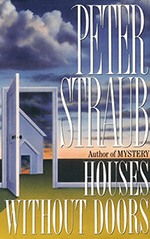
![]() charlesdee
charlesdee
9/3/2017
![]()
When I pick up a Peter Straub novel, I always think it looks too long. When I read A Dark Matter, his 2010 Stoker prizewinner, I thought it needed pruning by at least 100 pages. But I've always liked the Straub stories I've read in anthologies, and this collection shows that the long short story and novella may be his best format.
His title adapts a line from Emily Dickenson, "Doom is the house without the door --". A few of his characters inflict doom on others, but most find that they cannot escape their own. In the four major stories that compose the bulk of the book, varying levels of the supernatural figure into the narratives, and searchers after traditional horror motifs will be disappointed. "The Juniper Tree" describes in disturbing detail a seven-year-old boys life-defining encounter with a pedophile. (This story ties into Straub's trilogy of novels that includes Koko, Mystery, and The Throat.) The middle son of a dysfunctional working-class family discovers his adeptness at hypnosis in "Blue Rose." The sadistic games he plays with his newfound power end in tragedy, but the true horror is the insight the story gives into those who commit war crimes and get accepted into Columbia Law School. There is a satisfying blend of creepy humor and pathological behavior as the protagonist of "The Buffalo Hunter" slips into insanity, but here the supernatural element is a disappointment rather than a final payoff to what has gone before. Readers looking for a traditional ghost story in a creepy mansion almost get what they want in "Mrs. God," but as in his award winning "The Ballad of Ballard and Sandrine," Straub drags the reader into perverse and ultimately baffling territory.
These will not be journeys to many readers liking, but they have renewed my interest in Straub as an experimenter in contemporary horror